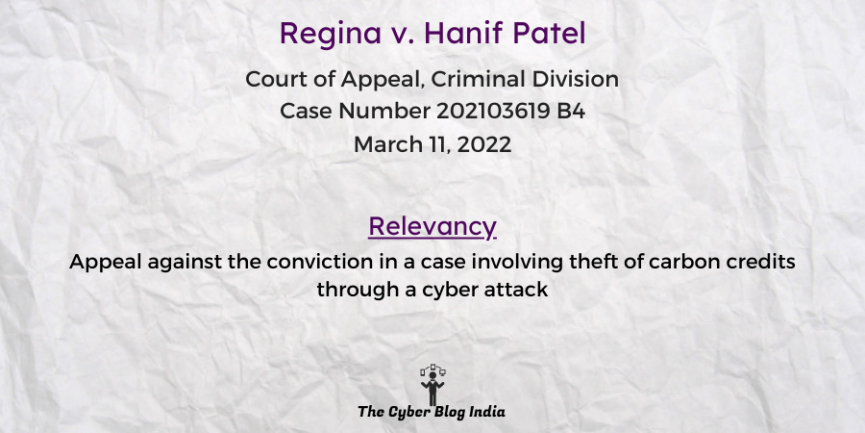Regina v. Hanif Patel

Regina v. Hanif Patel
[2022] EWCA Crim 451
In the Court of Appeal, Criminal Division
Case Number 202103619 B4
Before Lord Justice Fulford, Vice President, Justice Knowles, and Justice Cotter
Decided on March 11, 2022
Relevancy of the Case: Appeal against the conviction in a case involving theft of carbon credits through a cyber attack
Statutes and Provisions Involved
- The Serious Crime Act 2007 (Section 46)
Relevant Facts of the Case
- The Carbon Emission Registry in the Czech Republic faced a cyber attack on January 18, 2011. This attack resulted in the theft of 500,000 carbon credits worth €7 million.
- Two entities were involved in buying and selling these carbon credits. Eventually, they ended up with SVS Securities. The appellant oversaw the formation of the second company called Huntingdon Zoo.
- The appellant had three other co-accused persons who pleaded guilty to one count of encouraging or assisting a serious offence. He had close relationships with all three individuals.
- The Crown Court at Preston convicted the appellant and sentenced him to seven years’ imprisonment. Earlier in 2015, the Court of Appeal had rejected his renewed application for leave to appeal conviction and sentence.
- The appellant has approached this court because the judge did not give directions on the issue of mens rea regarding jurisdiction. He contends that if the jury received the instructions, it would not have convicted him in the first place.
Prominent Arguments by the Counsels
- The appellant’s counsel submitted that he did not know his company would be a part of a criminal purpose. For a conviction under Section 45, the accused must know or believe that the act would amount to the anticipation of an offence, wholly or partly, in England and Wales. He further submitted that at the time of the appellant’s involvement, Huntingdon Zoo was operating in the Polish jurisdiction. The prosecution’s case also followed that the appellant was at a considerable distance from any criminality that took place in England or Wales.
- The prosecution argued that the appellant assisted in the creation of Huntingdon Zoo. He knew it would be used as a part of a criminal enterprise. The prosecution’s counsel emphasised the speed at which Segal SP sold carbon credits to Huntingdon Zoo and eventually to SVS securities.
Opinion of the Bench
- The evidence was inconclusive regarding the appellant’s knowledge of the company’s involvement in criminal purposes. The prosecution accepted there was no evidence to assert that he was involved in the theft of carbon credits.
- The Crown Court should have left this matter of substance for the jury’s consideration.
- The appellant’s conviction was unsafe due to the absence of a direction regarding the jurisdictional element necessary for proving the offence.
Final Decision
- The court allowed the appeal and quashed the conviction.
